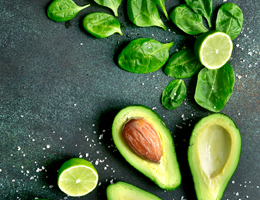
Everybody needs folate. This B vitamin helps the body produce new cells, a never-ending task that's essential to health and strength.
But if you're a woman considering pregnancy, this nutrient takes on a whole new meaning. If all mothers got enough folate before and during pregnancy, it could prevent up to 70% of neural tube defects (NTDs), according to the March of Dimes.
How folate helps
NTDs are serious birth defects of the brain and spine. About 3,000 pregnancies are affected by neural tube defects every year. According to the March of Dimes, NTDs include:
- Spina bifida, a condition in which the spinal cord is exposed. Most people with this condition are of normal intelligence. However, they may experience varying degrees of disability, including paralysis and lack of bowel and bladder control.
- Anencephaly, a condition in which most or all of the brain is absent. This condition causes death shortly after birth.
Folate—and its man-made form, folic acid—is a vital building block for the neural tube, which eventually becomes the brain and spinal cord. Because the neural tube is formed in the first weeks of pregnancy—before many women even know they're pregnant—every woman who may become pregnant should get enough folate every day.
Building up folate stores before pregnancy helps ensure that folate will be available to the fetus when the neural tube is forming. If you think you don't need folate because you're not planning a pregnancy, consider this: About half of all pregnancies in the United States are not planned, according to the March of Dimes. By the time many women even know they're pregnant, NTDs have already had ample time to develop. Most of these defects happen very early in pregnancy.
How much and where
The March of Dimes recommends that all women who could become pregnant take a multivitamin each day that includes 400 micrograms of folic acid. Once you're pregnant, folic acid consumption should increase to 600 micrograms per day. The March of Dimes also recommends including plenty of folate-rich foods in your diet. Foods naturally rich in folate include:
- Dark green, leafy vegetables such as spinach and romaine lettuce.
- Citrus fruits and juices.
- Beans and peas.
- Avocados.
- Asparagus.
You can also get folate from enriched cereals, breads, pastas and other grain products. Since 1998, folic acid has been added to all cereal grain products labeled as enriched. Check the nutrient labels of these products to find out how much folate you'll get from one serving.
If you've had a baby with an NTD in the past, your doctor may recommend taking even larger doses of folate. Even if you haven't had a baby with one of these birth defects, it's always wise to schedule a visit with your doctor if you know you're going to try to get pregnant.
The sooner the better
If you think you may want to get pregnant someday, or if there's any chance you could get pregnant, start thinking about folate now. It's good for your body no matter what, and it's essential for having a healthy baby.
Reviewed 7/7/2025